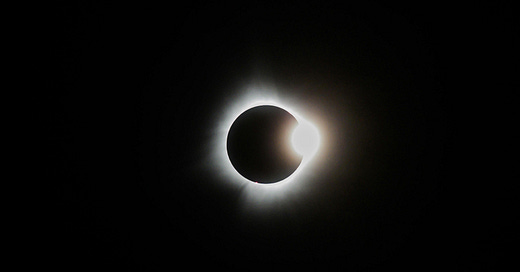Urban Planning and Eclipse Revelations
How does our physical environment contribute to our digital addiction?
Scroll Sanity is made possible by paid subscriptions. If you value the work I’m doing, consider becoming a paid subscriber today.
Hello friends! It has been a hectic month on this end with lots of travel, friends, and gardening galore. The cicadas are hatching and the spring carnival has sprung up in our local supermarket parking lot.
A few weeks ago, I had the good fortune of traveling to Montreal to view the total solar eclipse, and I wanted to share some reflections from that experience. First of all, I was curious to find that Canadians seemed much less attached to their phones than Americans. I observed people sitting in parks and simply… being. In one instance, I was sitting in a square and, of the twenty people sitting on benches and around the fountain, none of them were on their phones. One person was even READING A BOOK.
Montreal is often referred to as a European city in North America, and there’s a lot to be said about that in terms of the city’s design. In the neighborhood where we were staying, there were many parks, pedestrian walkways and squares that were spaces meant purely for human enjoyment. You don’t see that as much in American cities, especially cities that are newer such as my hometown of Miami, which is a bastion of American hyper-consumerism and individualism.
There are very few public places where you can go to hang out without shelling out money. (We joke that, in Miami, you get charged a fee just to breath. We often talk about the expensive nature of living in our city as paying a “sunshine tax.”) Everything has been privatized and turned into a capitalist experience. Plus, there’s the fact that there’s no way I can leave my childhood home in Miami and meander through the streets, maybe hop on a subway or practice the art of being a “flaneur.” No. In most American cities and suburbs, you leave your house in your personal vehicle and you have a destination in mind, usually a place of commerce. In America, it is quite difficult to wander, specifically in an urban setting. (Unless you live in a city like New York or San Francisco.)
I think about this when I read
’s newsletter, . Mehret writes a lot about living life outside of the digital realm, out in the real world. She also lives in a different Canadian city, one with decent public transportation and a vibrant urban atmosphere. She can leave her apartment and wander her city, open to the possibility that she might come across something interesting out in the “real world.” I can leave my house in North Carolina and bike to downtown, but I will likely not encounter many other people out and about, or simply “hanging out” in public.I think part of why Americans spend so much of their lives in the digital world has to do with the design of our cities and suburbs. They have not been designed with humans or community in mind.
We lack tremendously in public transportation and public spaces where citizens can gather with the sole intention of being out in the world. If the world outside our door isn’t welcoming, communal or accessible, what choice do we have except to retreat to our private individual space?
We’re lonely and desperate for human connection, so we’re going where the people are: online.
I remember being in Spain for the first time and seeing entire towns spill out onto the central plaza in the late afternoons, old people catching up with friends on benches and young kids playing tag or biking around. That’s when I first had the revelation: shopping malls are America’s town squares. As is often the case, capitalism is the root of all evil.
On another note entirely, the total solar eclipse had nothing to do with capitalism. If you think about it, it’s a transcendent experience that was available to all humans (within the totality zone) without a price tag, regardless of race, class or economic status. Of course, there’s privilege involved, such as being able to travel to a place within the zone of totality, or having the time off from work to step outside and witness this incredible phenomenon. But for most people within that zone, all they had to do was look up at the sky—this place that belongs to us all.
It was a euphoric and mind-boggling experience, to see stars appear in the middle of the day. Even though I “knew” what was going to happen, no amount of research or reading could have prepared me for the physical and metaphysical experience of witnessing the sun disappear behind that beloved moon. Because it was completely unlike anything I’ve ever experienced, it was hard to comprehend in the moment the reality of what was happening before my eyes. I was completely present—mind, body and spirit—in a way that we so rarely are these days. That is why I don’t think transcendent is too strong a word to describe my experience.
In the hours after the eclipse, I was shell-shocked. Then, like a comedown from a high, I started to feel gloomy and blue. I had witnessed something supernatural and life-affirming, and yet, the moment had passed. I was back to reality and there’s was nothing I could do to relive that full body experience. The total solar eclipse had been just that: a fleeting moment of pure presence, of magic, of connection to humanity and the cosmos.
I kept replaying the moment in my head, wanting to stamp every detail in my mind. I desperately wanted to hold onto that feeling of amazement and humbling bewilderment. In the days that I followed, I scoured the internet, trying to find a photograph or video that could help me relive that moment. Nothing came close.
I’ve written before about our desperation to know everything, and the way the internet and smartphones fuel that misguided belief that we actually can. With digital technology, a moment or a life can be thoroughly documented so that we can forever hold onto it – or think that we have. Because everything lives on the internet for all eternity, we can’t let things go. We can go back in time. Or, once again, we think that we can.
There was something so uncomfortable for me about this realization that the eclipse was an experience that existed only in that moment, something I could savor only in my memory – a memory that is faulty and forever fading as time marches on.
But the truth is, I don’t need a photograph or a video to remember the way my father’s eyes crinkled when he smiled, or the sound of his laughter. No matter how many digital mementos I keep of my father, it doesn’t change the fact that I can’t call him on the phone or show him around my garden. I can feel certain details or memories of my father slipping away; that is the nature of memory and the human experience. We want to believe that we no longer are beholden to these human limitations, because we have the power of digital technology on our side. But the truth is, we’re still human, and that’s a humbling – and beautiful – thing.
How do you interact with your physical environment? Does it make it easier or harder to live life offline?
Check out our latest podcast episode!
Finding "Phone-Life" Balance with SLEKE. Co-Founders Austin Boer & Brennan Jordan
In this episode of the Scroll Sanity Podcast, hosts Nic and Carmella delve into the balance between technology and daily life with Austin Boer and Brennan Jordan, co-founders of SLEKE. Inspired by their time in Asia, Austin and Brennan discuss the development of SLEKE, a device designed to provide essential smartphone functionalities with minimal distra…






The picture you're describing reminds me of a 30 year old photograph.
Young Bianca is at the beach, holding some flags, grinning ear to ear, and you can see all of these people in the background walking and chilling behind me.
At a first glance you can't tell what's "wrong" or different. But when you pay close attention you realize no one is on their phones, because there weren't any.
It's hard to imagine that happening today.